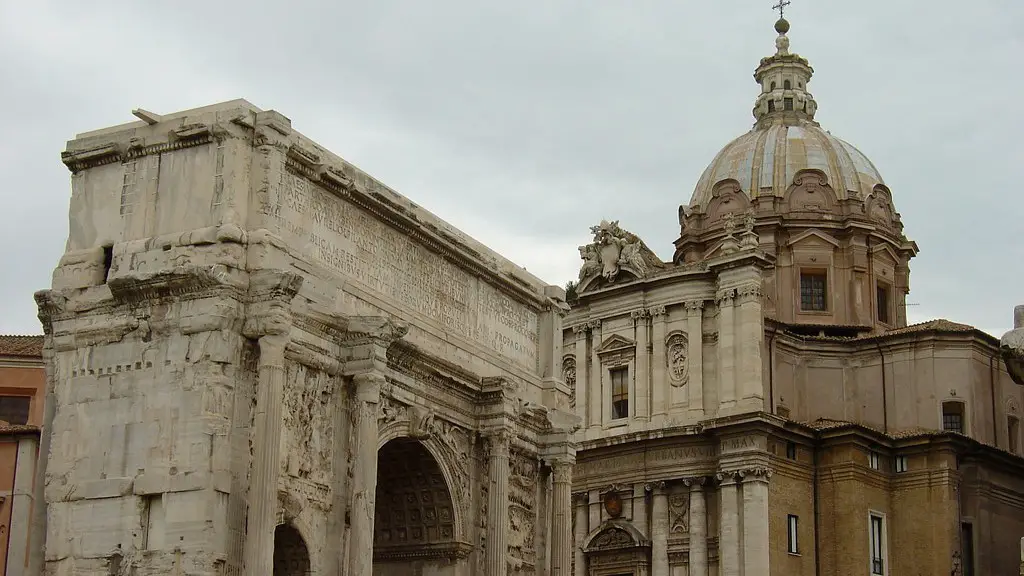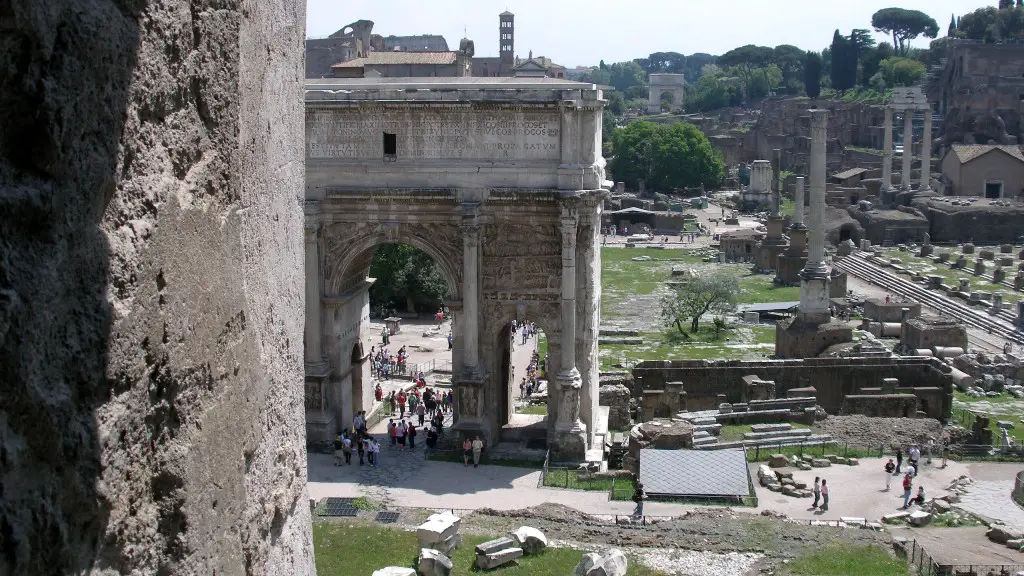Christianity was largely seen by the ancient Roman empire as a religion of the poor. The religion had a huge appeal to the lower classes in Rome as it offered a certain type of solace that was not available from other religions. Christianity was also seen as a source of hope and empowerment for the disadvantaged in Roman society at the time.
Christianity, unlike other religions of the time, was not a hierarchical and hierarchical structured religion like the Roman pagan religion, which excluded any religious involvement from those who were not titled. The gospel that Christians preached was seen as a source of equality rather than the practice of hierarchical reverence for those of higher rank in Roman society. This message of equality was one of the main reasons why the religion gained the following it did amongst the less affluent classes in Ancient Rome.
Moreover, there was an emphasis on charity in Christianity that particularly appealed to the poor. Christianity helped create an environment of trust and safety, providing comfort and support to those in need. While other religions of the time did not offer such a strong emphasis on generosity, Christianity provided this to its adherents, making it an attractive religion to those in poverty. Additionally, Christianity promoted the concept of human equality, which drew the attention of the less well-off in Rome.
The Christian faith also offered the kind of hope that the Roman Empire was not able to. In the political sphere, the Roman Empire was seen to be organised around the consensus of a powerful and influential elite, in which the poorer classes were not included. Christianity, however, offered the hope of liberation from oppressive political systems, which was seen as a great source of comfort for those who had been ostracised and excluded from the decisions of the Roman elite. This hope was in stark contrast to the political climate of the time, creating an attractive proposition for those of the lower classes in Rome.
The teachings of Jesus, which emphasised the importance of kindness, sympathy and generosity, were a far cry from the typical Roman way of life. The traditional Roman system saw poverty as a sign of weakness, and it was seen as a shameful thing to be poor. Christianity, however, highlighted the plight of the poor, and encouraged its believers to be generous with those in need. This message was seen as a radical counter-cultural move, and gained many supporters from those from the lower classes in Rome.
Additionally, Christianity also provided a sense of spiritual fulfilment that was not offered by other religions at the time. It gave people a community to belong to and support them, as well as offering the hope that there was an afterlife waiting for them in Heaven. This promise of spiritual fulfilment appealed to those of the lower classes in Roman society, particularly when traditional Roman religion seemed to be leaving them behind.
Christianity was very popular amongst the less affluent classes in Ancient Rome due to a combination of its message of equality, its emphasis on charity, its promise of liberation, and its spiritual teachings. It was seen as a radical alternative to the oppressive and hierarchical political structures of Roman society, and offered a sense of hope where there was none before.
Christianity and Social Transformation
Christianity, through its message and teachings, brought about a sense of social transformation for those in the lower classes in ancient Rome. For example, it provided an opportunity for people to come together and form communities which could not have otherwise existed in the rigid Roman social hierarchy. Additionally, Christianity offered people the possibility of escape from poverty, providing a way out for those who were disadvantaged.
Christian values, such as charity and equality, were seen as having the potential to bring about real and lasting change for those in the lower classes, providing them with hope and a sense of unity with those around them. This is evidenced by the way in which the religion continued to spread throughout the Roman Empire, eventually becoming the official religion of the Empire in the 4th century AD.
Christianity also provided a unique way in which to express devotion to God and to each other, an expression that was distinct and unique to the religion. Through this, people of the lower classes in Ancient Rome were able to exercise their own agency and, in doing so, find a sense of purpose and meaning in their lives.
Moreover, Christianity offered the possibility of ascension to a higher social class for those who were in the lowest rung of the Roman Empire. It provided an avenue for the less privileged in Roman society to rise in the ranks, and it did so through the Christian message of equality which resonated with those in need of change.
Christianity, therefore, is a religion which, at least in part, was seen to appeal to the lower classes in Ancient Rome due to the social transformation it promoted. The values and teachings of the religion provided a sense of hope, comfort, charity and emancipation to those in the lower classes and, ultimately, facilitated the spread of the religion throughout the Roman Empire.
Christianity and Political Transformation
Christianity also had a profound impact on the political climate of the Roman Empire in the centuries leading up to its eventual adoption as the official religion. Through its message of liberation and equality, the religion directly challenged the oppressive and hierarchical structures in place at the time. Beneficially, this meant providing an opportunity for those of the lower classes in Roman society to rise up in the political sphere.
The civil wars of the late first century which brought an end to the Republic in Roman history saw a transformation in the way in which the people of Rome were governed, with power moving from the Senate to the Emperor. This was a dramatic change which made it increasingly difficult for those of the lower classes to achieve any kind of social advancement, yet Christianity provided them with the opportunity to rise up and challenge the status quo.
The early Christians also engaged in acts of defiance against the Roman Empire, such as not paying taxes or refusing to take part in military service, which earned them the hatred of the Romans. By engaging in such acts of defiance, the early Christians spread their message and demonstrated their commitment to their faith and its principles. Consequently, this helped to spread the influence of Christianity and increased its popularity amongst the lower classes of Roman society.
The Church also acted as a means by which those from the lower classes of Roman society could rise in the political aspects. By forming their own councils made up of bishops, clergy and other members of the church, individuals could directly participate in the politics of the Roman Empire without having to conform to the rules of the elite. Consequently, the Church had a huge impact on the political climate of the time, providing a platform for those with more liberal ideologies to spread their message of liberation.
Christianity, therefore, had a direct and profound impact on the political climate of the Roman Empire. It provided an opportunity for those of the lower classes to rise up in the political sphere, and created a space in which freedom of thought and speech could be exercised. It also helped to spread the message of liberation and equality far and wide, making it an attractive proposition to the less privileged in Ancient Rome.
Christianity and Cultural Transformation
Finally, Christianity had a huge impact on the cultural landscape of the Roman Empire during its period of expansion. Christianity provided a framework of morality and ethics which was in stark contrast to the Roman way of life as it prioritised mutual respect and compassion over the pursuit of wealth and power. In this way, Christianity was a source of much needed moral guidance for those of the lower classes in Ancient Rome, who would have no other means of accessing such a moral framework.
Consequently, Christianity drastically changed the cultural tapestry of the Roman Empire. By introducing concepts such as mercy, charity and humility, Christianity provided a countercultural perspective to the traditional Roman way of life which emphasised the attainment of wealth and power. This new moral framework provided much needed comfort and solidarity for those of the lower classes, and enabled them to participate in the rich cultural diversity of the Roman Empire.
The approach taken to art and culture, too, was drastically changed by Christianity. Whereas Roman art was largely centred around materialism, Christianity shifted the focus to spiritual, philosophical and moral stories. This had the effect of elevating the status of those of the lower classes, as they were able to participate in this new cultural landscape and create art which was seen as being of equal or greater value than that of their wealthier peers.
Thus, it is evident that Christianity had a profound impact on the cultural life of the Ancient Roman Empire. It provided a moral framework which was in stark contrast to traditional Roman culture, bringing a sense of comfort and solidarity to those in the lower classes. Additionally, it enabled those from the poorer classes to access and participate in the cultural landscape of the Roman Empire in capacities which had not been available to them before.
Conclusion
In conclusion, it is evident that Christianity was hugely appealing to the lower classes in Ancient Rome due to its message of equality, its emphasis on charity, its promise of liberation, and its spiritual teachings. It offered a sense of hope, comfort and solidarity to those who had been ostracised and excluded from the decisions of the Roman elite, and provided a space in which they could assert their own agency and influence both politically and culturally. As such, Christianity was the ideal religion for those of the lower classes in Ancient Rome, and its popularity amongst them was a testament to this.





